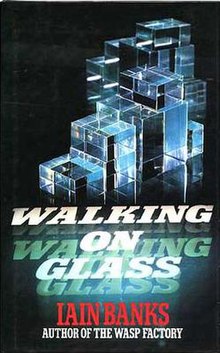
Iain Banks was a Scottish author, writing mainstream fiction as Iain Banks and science fiction as Iain M. Banks, adding the initial of his adopted middle name Menzies. After the success of The Wasp Factory (1984), he began to write full time. His first science fiction book, Consider Phlebas, appeared in 1987, marking the start of the Culture series. His books have been adapted for theatre, radio, and television. In 2008, The Times named Banks in their list of "The 50 greatest British writers since 1945".

The Wasp Factory is the first novel by Scottish writer Iain Banks, published in 1984. Before the publication of The Wasp Factory, Banks had written several science fiction novels that had not been accepted for publication. Banks decided to try a more mainstream novel in the hopes that it would be more readily accepted, and wrote about a psychopathic teenager living on a remote Scottish island. According to Banks, this allowed him to treat the story as something resembling science fiction – the island could be envisaged as a planet, and Frank, the protagonist, almost as an alien. Following the success of The Wasp Factory, Banks began to write full-time.
The Culture is a fictional interstellar post-scarcity civilisation or society created by the Scottish writer Iain Banks and features in a number of his space opera novels and works of short fiction, collectively called the Culture series.

Inversions is a science fiction novel by Scottish writer Iain M. Banks, first published in 1998. Banks has said "Inversions was an attempt to write a Culture novel that wasn't."

Castlevania: Aria of Sorrow is a 2003 action role-playing game developed and published by Konami. It is the third Castlevania game for the Game Boy Advance. Producer Koji Igarashi, who had led the production teams for previous Castlevania games, led Aria of Sorrow's development as well. Michiru Yamane returned to compose the music alongside Takashi Yoshida and Soshiro Hokkai. Director Junichi Murakami was new to the Castlevania series.
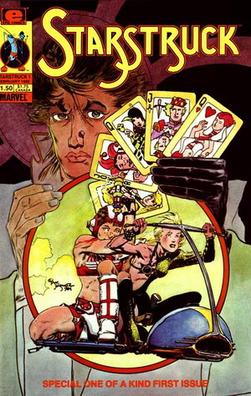
Starstruck is an American science fiction comic book series. It is based on the off-Broadway stage play of the same name written by Elaine Lee, with contributions from Susan Norfleet Lee and Dale Place. An audio drama has also appeared.
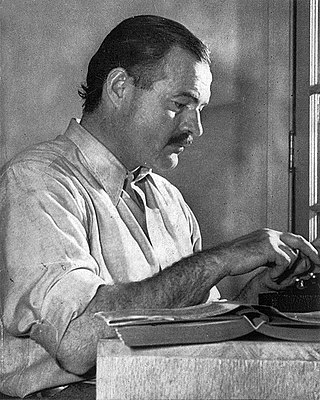
The iceberg theory or theory of omission is a writing technique coined by American writer Ernest Hemingway. As a young journalist, Hemingway had to focus his newspaper reports on immediate events, with very little context or interpretation. When he became a writer of short stories, he retained this minimalistic style, focusing on surface elements without explicitly discussing underlying themes. Hemingway believed the deeper meaning of a story should not be evident on the surface, but should shine through implicitly.

"Operation: Galactic Storm" is a 19-part comic book crossover storyline which ran through Marvel Comics' Avengers related titles – Avengers, Avengers West Coast, Captain America, Iron Man, Thor, Wonder Man, and Quasar – between March and May 1992.

Matthew Rose is a fictional character from the BBC soap opera EastEnders, played by Joe Absolom from 26 August 1997 to 3 February 2000. He was introduced in 1997. In a deviation from typical casting protocol, the role of Matthew was constructed for Absolom after he auditioned for the production team; they were looking for new, raw talent and developed the character after they saw him perform. Matthew's most prominent storyline surrounded him being framed for murder and his wrongful imprisonment. The storyline captivated public interest with various newspapers starting nationwide campaigns for the character's release. Absolom decided to leave the soap, believing that the storyline could not be advanced further or bettered. He made his final appearance in February 2000 after taking revenge on his employer Steve Owen, the man who framed him for killing his old girlfriend Saskia Duncan on Valentine's Day 1999. Matthew was not killed off in the serial and producers at the time suggested that the door had been left open for a possible return.

From Noon till Three is a 1976 American Western film released by United Artists. It stars Charles Bronson and his wife, Jill Ireland. It was written and directed by Frank D. Gilroy, based on his novel.

Inkheart is a 2008 fantasy adventure film directed by Iain Softley, produced by Cornelia Funke, Dylan Cuva, Sarah Wang, Ute Leonhardt, Toby Emmerich, Mark Ordesky, Ileen Maisel and Andrew Licht, written by David Lindsay-Abaire, music composed by Javier Navarrete and starring Brendan Fraser, Paul Bettany, Helen Mirren, Jim Broadbent, Andy Serkis, and Eliza Bennett. It is based on Cornelia Funke's 2003 novel of the same name.

Dolly Skilbeck is a fictional character from the British television soap opera Emmerdale. Dolly made her first on-screen appearance during the episode broadcast on 22 February 1977. The character was initially played by Katharine Barker, before Jean Rogers took over the role in 1980. She remained in the role until her departure from Emmerdale in 1991. Dolly is characterised as kind, generous and a homemaker. She is a "townie" from Darlington who arrives in Beckindale to work at the local pub, The Woolpack. Writers quickly developed a romance with Matt Skilbeck. He was a widower and had previously has two children that had died.
The Revelation Space series is a book series created by Alastair Reynolds. The fictional universe it is set in is used as the setting for a number of his novels and stories. Its fictional history follows the human species through various conflicts from the relatively near future to approximately 40,000 AD. It takes its name from Revelation Space (2000), which was the first published novel set in the universe.
The Culture series is a science fiction series written by Scottish author Iain M. Banks and released from 1987 through to 2012. The stories centre on The Culture, a utopian, post-scarcity space society of humanoid aliens, and advanced superintelligent artificial intelligences living in artificial habitats spread across the Milky Way galaxy. The main themes of the series are the dilemmas that an idealistic, more-advanced civilization faces in dealing with smaller, less-advanced civilizations that do not share its ideals, and whose behaviour it sometimes finds barbaric. In some of the stories, action takes place mainly in non-Culture environments, and the leading characters are often on the fringes of the Culture, sometimes acting as agents of Culture in its plans to civilize the galaxy. Each novel is a self-contained story with new characters, although reference is occasionally made to the events of previous novels.

The Annandale Way is a 90-kilometre (56 mi) hiking trail in Scotland, which is officially designated by NatureScot as one of Scotland's Great Trails. It follows the valley of the River Annan from its source in the Moffat Hills to the sea in the Solway Firth south of the town of Annan. The route, which was established on 12 September 2009, has been designed to be traversable in four to five days as a continuous walk but it also offers several day-walks. Overnight stops can be arranged in small market towns and villages along the route such as Moffat, Johnstonebridge, Lochmaben, Lockerbie, or Annan. The route has been developed by Sulwath Connections and local communities, with the support of local estates and farmers, to help promote Annandale as a new area for walking. Its trailheads are near the Devil's Beef Tub in the Moffat Hills and on the Solway Firth just south of Annan, in Newbie.
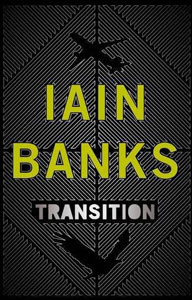
Transition is a novel by Scottish writer Iain Banks, first published in 2009. The American edition was published under the name "Iain M. Banks", which is the name Banks used for his science fiction work.

Walking with the Enemy is a 2014 American action drama film directed by Mark Schmidt, and scripted by Kenny Golde and Mark Schmidt. The film stars Jonas Armstrong, Ben Kingsley, Simon Kunz, Hannah Tointon, Simon Dutton, Burn Gorman, and Charles Hubbell. It is inspired by the true story of Pinchas Tibor Rosenbaum.
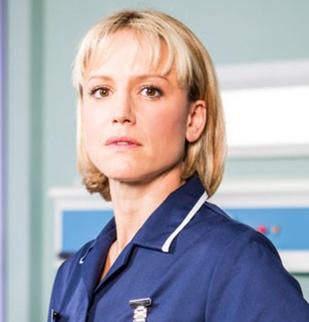
Rita Freeman is a fictional character from the BBC medical drama Casualty, played by Chloe Howman. She first appears in the twenty-eighth series episode "Once There Was a Way Home – Part One", first broadcast on 10 August 2013. Howman's casting was announced four days before her debut. She attended multiple auditions against other actresses for the role. Rita is introduced as a new staff nurse at Holby City Hospital's emergency department (ED). She is characterised as fun, feisty, blunt and excellent at her job, which means patients are at ease around her. Howman compared the character to a Jack Russell Terrier. Despite being a popular member of staff, Rita struggles to make personal relationships. Rita's first episode features an incident at her flat when her ceiling caves in; Howman liked the introduction and found it dramatic. Throughout her tenure on the show, Rita has been promoted twice: on first instance to senior staff nurse and on second instance to clinical nurse manager.

Sam Nicholls is a fictional character from the BBC medical drama Casualty, played by Charlotte Salt. She first appeared in the twenty-sixth series episode "Mea Culpa", broadcast on 15 October 2011. Sam is a former major in the Royal Army Medical Corps, who joined the Holby City Hospital Emergency Department on a nine-month secondment, later becoming a Specialty registrar in emergency medicine. Salt was contracted for a year and she spoke with army medics to help her prepare for the role.

Iain Dean is a fictional character from the British medical drama Casualty, played by Michael Stevenson. He was first introduced in a Red Button episode, which explores Sam Nicholls's fictional backstory as a medic in the army, alongside Iain with whom she is having an affair. The character then made his first appearance in the main show in the twenty-sixth series episode "Appropriate Force", broadcast on 28 April 2012. Iain gives evidence during a General Medical Council hearing, after Sam is accused of assaulting a patient. He returned in August 2013 this time as a trainee paramedic, who works alongside Jeff Collier and Dixie Dixon. He is also reunited with Sam, who is now in a relationship with Tom Kent. Stevenson confirmed that Sam was Iain's reason for coming back to Holby, and that he had hoped to start up their romance again. In November 2013, the character was the focus of another Red Button special, which helped to mark Remembrance Day and explore Iain's time in the army and relationship with Sam. It later emerges that Iain has posttraumatic stress disorder from being one of two survivors of a suicide attack in Afghanistan. Stevenson was pleased to have the chance to look further into his character's backstory. Following an incident in which Iain is held hostage and Big Mac is injured, he leaves Holby in the episode broadcast on 22 March 2014.
